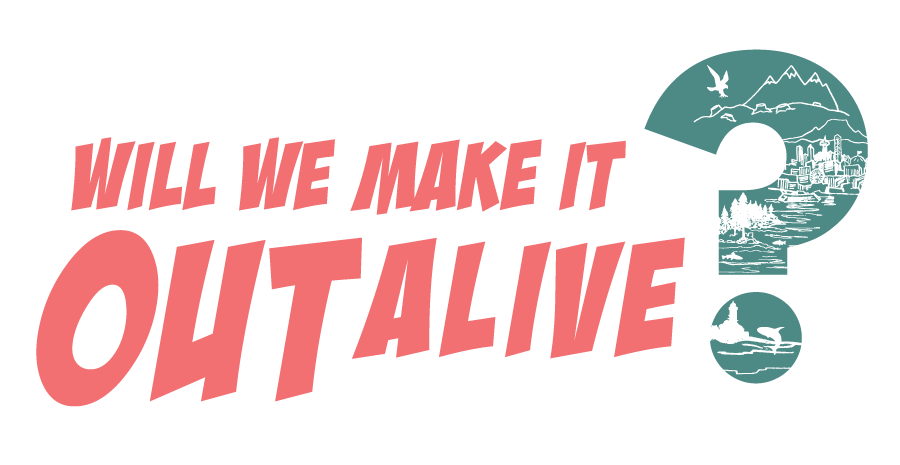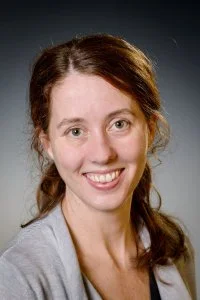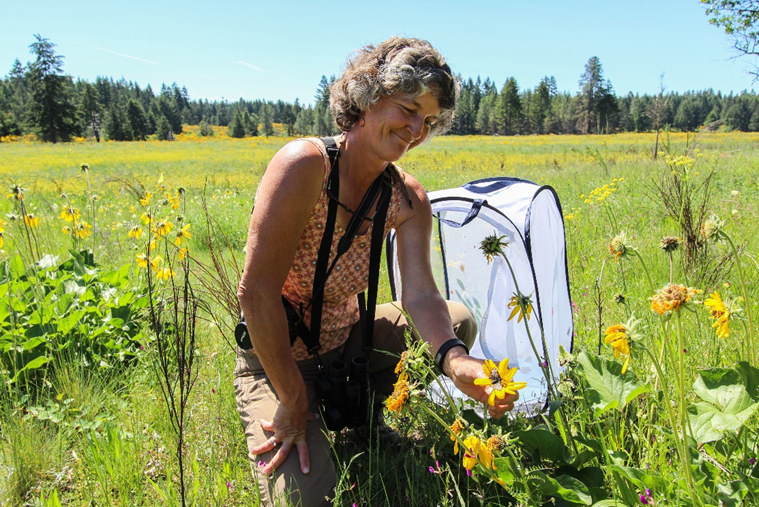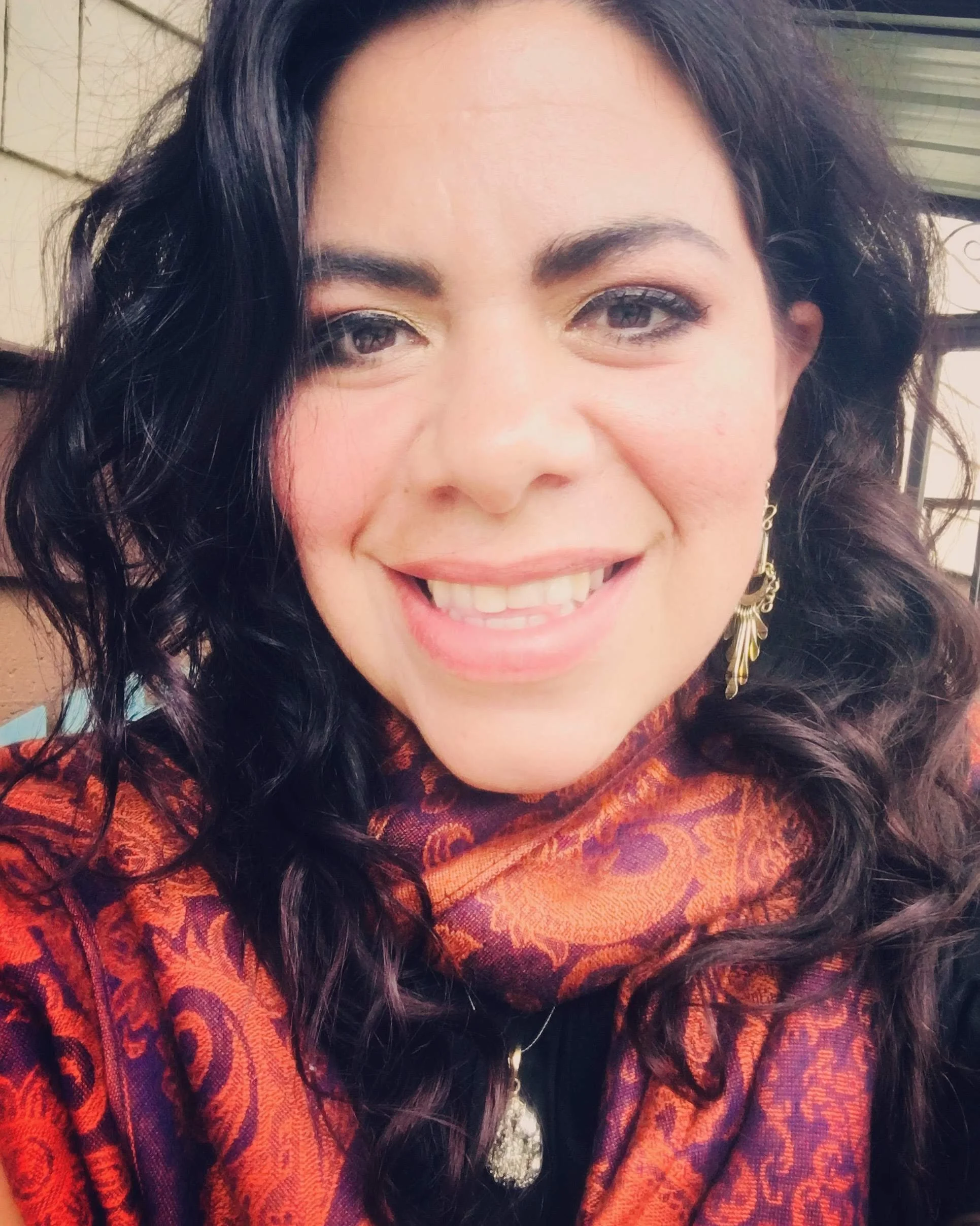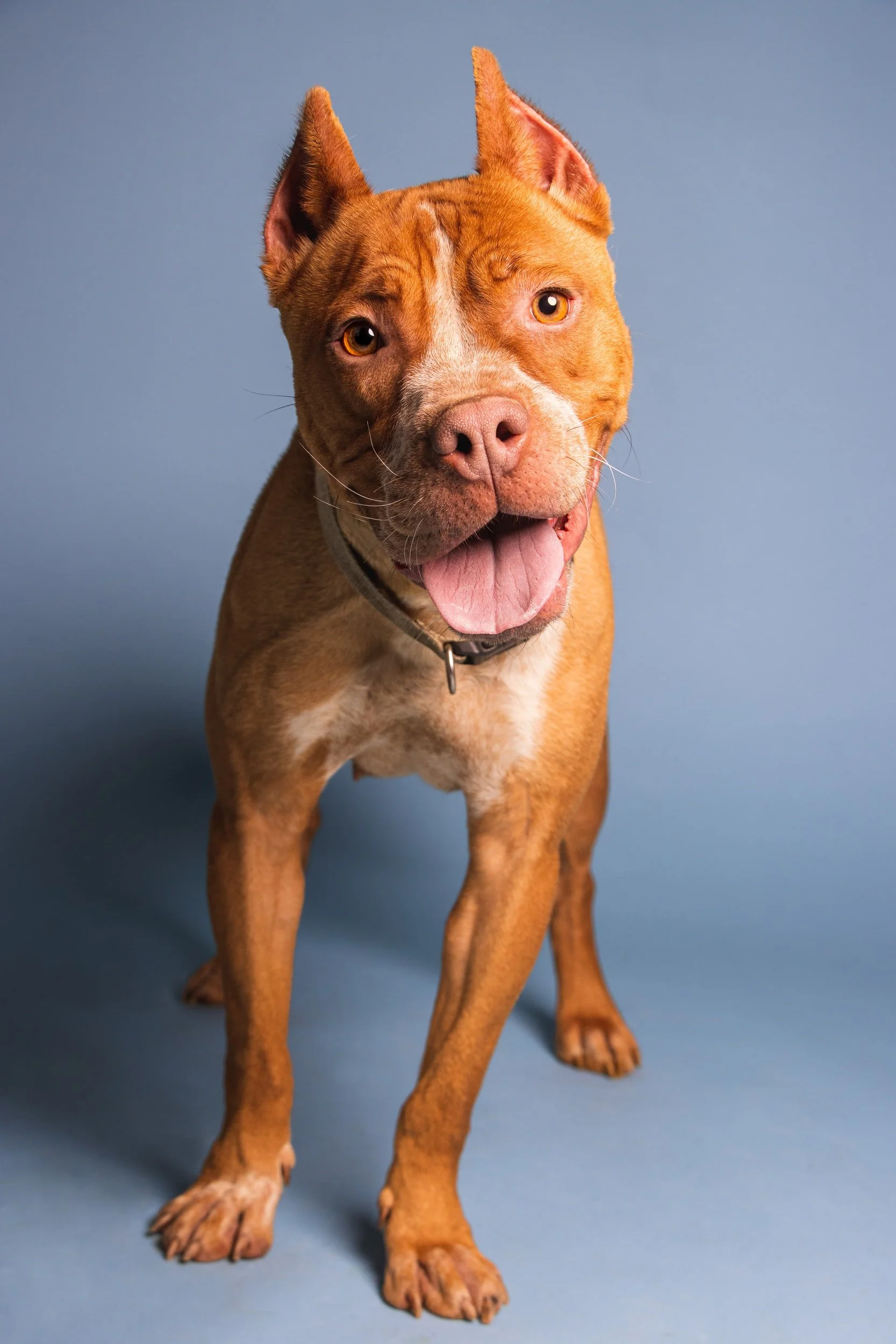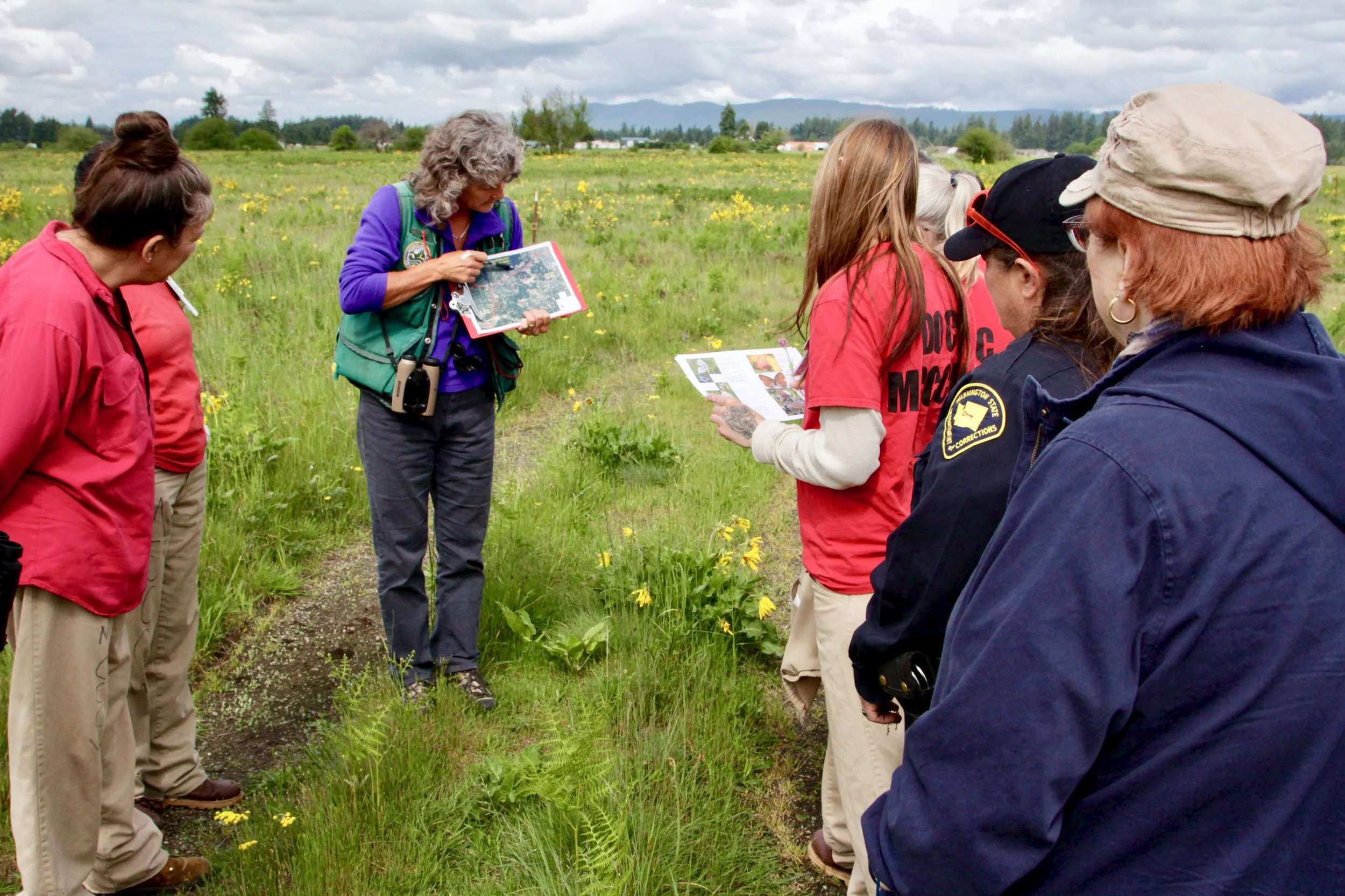S3E3: If You’re not a partner of the solution, you’re a partner of the problem!
/Welcome to Season 3, Episode 3, If You’re not a Partner of the Solution, You’re a Partner of the Problem; Partnerships and Programs with the Sustainability in Prisons Project (aka SPP). This season is all about the Sustainability in Prisons Project, what they do, why they do it and how you might be able bring your skills and knowledge to incarcerated individuals.
For this episode, we interviewed Kelli Bush, the Sustainability in Prisons Project Director; Mary Linders, WDFW Wildlife Biologist; and Carolina Landa, a former butterfly technician. In this episode we dive into the complex web of partnerships that SPP maintains for their various, changing and growing programs. At the heart of this whole organization is a web of partnerships that keep everything moving forward and also ensure that projects are safe and appropriate for the prison environment.
Interviewees’ Background and Experience
Kelli Bush
Kelli Bush is the co-director of the Sustainability in Prisons Project. She helps bring nature, science and environmental education into prisons in Washington. She also leads staff from The Evergreen State College that coordinate programs in the prisons. She has a Bachelor's degree in Agriculture Ecology from The Evergreen State College.
Mary Linders
Mary Linders has worked as an endangered species recovery biologist for the Washington Department of Fish and Wildlife (WDFW) since 1994. For the past 18 years she has worked to protect and recover populations of five at-risk prairie and oak-associated species in the South Puget Sound region. As the lead biologist overseeing captive rearing and population re-establishment of the federally endangered Taylor’s checkerspot butterfly, Mary has grown the project from a captive rearing test trial to a program with two captive rearing facilities, 14 field sites, and nine conservation partners. All told, this effort is transforming thousands of acres of degraded grassland to high quality native prairie benefitting a multitude of other species. Mary holds a Bachelor’s degree in Anthropology from the University of Wisconsin-Madison and a Master’s degree in Wildlife Science from the University of Washington-Seattle. This background has served her well in a field where conservation values mesh with competing human values. Outside of work she enjoys gardening, hiking, camping, paddling and playing music with her husband and son.
Carolina Landa
Carolina Landa MPA, identifies as a Mexican-American woman. She currently works at the Office of the Corrections Ombuds as the Assistant Ombuds focused on Gender Equity and Reentry. She is a graduate of The Evergreen State College where she received her Bachelor’s degree with a focus on Law and Policy followed by her Master’s degree in Public Administration. Her three areas of specialized work are in Social Justice, Disabilities and Immigration. She currently serves as a member of the Washington State Developmental Disabilities Council. She strongly believes that people with lived experiences have the power through voice to impact the most effective change in our society.
Partnerships and Programs, oh my!
This episode is all about partnerships and programs in the Sustainability in Prisons Project (SPP). When we first started researching this topic, Amy the Poop Detective was amazed at the breadth of different organizations and project types that fall under the SPP umbrella.
SPP was initially formed as a partnership between The Evergreen State College (Evergreen) and the Department of Corrections (DOC) to bring science, nature and education into prisons in Washington State. It has since grown to almost 200 partnerships. The breadth and depth of the programs that they help facilitate is impressive, to say the very least. While we are most interested in conservation, nature and education programs, we learn that there are so many other types of programs/projects.
SPP Perspective on Partnerships and Programs
In this episode, Kelli Bush shares more about how partnerships form and function. One of the main points that she makes is that these programs can be started at any level, whether it be an idea from an incarcerated individual, DOC staff, Evergreen graduates or partners in the community (that could mean you!). She also describes how each project is evaluated to make sure that there is benefit to all involved parties. They especially do not want projects that are just looking for free or cheap labor. The primary types of benefits to incarcerated individuals are educational, therapeutic and/or job skill related. She also shares more about how new projects also must be vetted by the DOC to ensure that they meet their safety and risk reduction considerations associated with the prison environment.
We chat about how some projects are relatively easy to implement, for example education programs, where other programs are more difficult to implement such as the Taylor’s checkerspot butterfly program, which required a greenhouse to be built and potential risks to be considered.
She uses the composting program at the Monroe Correctional Facility as an example of how programs can start and grow. In this example, incarcerated individuals worked with DOC staff to develop an internal composting program. Over time, this program has grown into an award winning composting program and they have expanded their composting methods to include Bokashi composting (basically fermenting compost) and Black Soldier Fly Larvae composting, similar to vermicomposting, where the larvae eat through and break down food waste quickly. Here are some additional links to learn more about the SPP Bokashi and Black Soldier Fly Larvae composting programs.
She shares more about several programs that are not so science based, including:
A dog training program, where dogs live with and are trained by incarcerated individuals. They train dogs for children and adults for a variety of conditions. They also host foster animals, sometimes difficult to adopt animals, from many different agencies including the Kitsap Humane Society and Purrfect Pals.
A bike refurbishing program, which reduces waste by salvaging and restoring bikes that otherwise might be headed to the landfill. Then those newly tuned up bikes get awesome paint jobs and they are donated back to someone in need in the community.
There are lots of other cool partnerships that we did not get into. If you want to learn more, head over to SPP’s website and you can look through the many partners and projects.
Kelli shares a little about potential project gaps. One of the projects she hopes that the Magical Mapper might pursue is bringing more technology, like GIS, into the prisons. The other one that she feels is important is a program that supports successful reentry, and that includes housing and employment opportunities. She discusses how she initially thought this work might be done outside of the prison by another organization, but now she thinks it might be something that SPP should help develop. She wants partners to consider if organizations are willing to invest in previously incarcerated individuals once they are outside of the prison as well; helping them grow their environmental careers once they are released.
We talk about some of the barriers to new program development such as:
A general lack of space; prisons were not set up as educational facilities
Technology, computer and internet access
General capacity at SPP to take on and facilitate additional projects
Kelli also discusses how a big part of SPP’s work is to try and identify the roles and responsibilities for the involved partners. She talks about how communication, clarity of roles, community time investment and who gets recognition for the work are all important aspects to making the partnerships function and ensuring that all partners feel valued and needed.
She also shares a little bit about a new program on the horizon, the Evergreen Coalition for Justice, which just received funding for a year that starts this July. It will provide an opportunity to expand support for incarcerated individuals post release. They will partner with community colleges and other organizations to help fill the gaps where needs have been identified and to complement existing programs. They are pitching the idea to develop a program with current community organizations that are involved with SPP to work with previously incarcerated individuals post release.
Outside Organization Perspective on Partnerships and Programs
Next we get Mary in the hot seat to learn more about her experiences with partnerships and programs and in her work with WDFW. Mary shares more about how she partners with SPP to help recover the Taylor’s checkerspot butterfly. We’re going to focus more on the Taylor’s Checkerspot Butterfly Program next episode, but this interview with Mary is more about the partnership and program with SPP.
Mary shares some of the ins and outs of how the partnership started and how difficult it was to get support from WDFW for the project. She talks about some of the other partners in the Taylor’s checkerspot butterfly recovery program and what their roles are. Partners in this program include Joint Base Lewis-McChord, the Department of Defense, the US Fish and Wildlife, the Oregon Zoo, and SPP (which includes Evergreen and the Department of Corrections), and the butterfly technicians. We also dive into some more details of the program.
Next Mary talks about some of the things that potential new partners may need to consider if they want to develop a new SPP project or program. Some of the things that she mentions include that you have to really know what goals or products that you need, you also need to have critical and detailed planning, and in the end you need to be creative and flexible. She also shares a little about the impact this work has had on her and how it has been one of the most rewarding things she has ever done.
SPP Butterfly Technician Perspective on Partnerships and Programs
Finally, we bring in Carolina Landa to share her lived experience as a Taylor’s Checkerspot Butterfly technician. She discusses her experience with partnerships and how the SPP program helped her find her voice, move forward, and be successful after her release. Since she was a butterfly technician, she went on to earn her Bachelor's and Master’s degrees in Public Administration from The Evergreen State College and she is currently an Ombuds(wo)man for the Department of Corrections.
She shares how she became involved in the butterfly program and what some of the requirements were for her to become a butterfly technician. She also talks about how she was perceived by other inmates and how the program has grown in popularity. She shares some of the ins and outs, like how they spent 7 hours a day in the greenhouse during the active rearing season.
One of the areas that she thinks could use a new program or project developed under SPP would be a re-entry program or a work entry program, which of course is similar to what Kelli was saying! And it sounds like on some level the Evergreen Coalition for Justice will be able to help move this idea forward.
Carolina shares her perspective on whether she felt her experience participating in SPP was exploitative. She talks about what she gained from the program. One of the major benefits was she was the first person to receive 16 college credits for her participation in the program from The Evergreen State College. She also talked about the therapeutic aspect of working with the butterflies, being outside of the prison walls, able to spend her days in the sunshine of the greenhouse, and about the lifelong friendships that she made with the people that she worked with. She shares that near the end of her time she had to move on to another program that took up more of her time. She wasn’t able to work at the butterfly enclosure anymore, but she still volunteered her time there on the weekends!!!
As far as what she would change about the program, she says that she hopes that programs like this expand and are available to more participants and at different prisons.
She shares a little about what she is up to now, including being an advisor to SPP and her work as an Omsbud(wo)man for DOC.
As far as her experience with incarceration and reentry, she says that prisons are bad (m’kay) and most first timers never think that they will end up in prison. She shares that there are staff that want to do better, but the structure makes change very difficult. She says for those experiencing incarceration it is important to build your network, find your people and community and then you have people to ask if you need help. She also talks about how technology can be difficult to adjust to post release. She shares a little about the barriers that exist when you have a criminal background, namely around housing and employment. In Washington you can have your record vacated depending on the type of felony and Carolina helped fight for this change in Washington!
She also talks about how the view of the prison system is changing and how Washington State is making some changes. One of the programs that Washington has participated in is the AMEND program, which brings the principles of incarceration from Norway, where the goal is more restorative than punitive.
Finally, she helps us end with a little bit of humor when she shares a funny story about a corrections officer that took her job seriously.
Until Next Time…
Thank you so much for joining us this episode! We hope you learned more about how the Sustainability in Prisons Project uses partnerships to effectively leverage multiple partners to bring education, nature and science into the prisons and how their programs impact our communities and our environment.
We think the biggest takeaways from this episode include:
Partnerships must provide value to all involved
Partnerships and programs can start from any level, whether that’s an incarcerated individual, DOC or SPP staff, an outside organization, or an Evergreen graduate student and
One of SPPs main roles is as a facilitator, ensuring that projects and programs run effectively
We also learned that some projects are easy to implement, such as being a guest lecturer or developing some educational materials, while other programs are more difficult to implement, such as the butterfly program, which requires learning how to successfully rear butterflies in a prison and building the necessary infrastructure to do so.
Please don’t forget to rate, review and subscribe on Apple Podcasts, Stitcher, or wherever you get your podcasts (like Tune In, Castbox Himalaya, iheartradio, etc). Please let us know what you think in the comments below or on our Facebook page.
Until next time, Will We Make It Out Alive?
